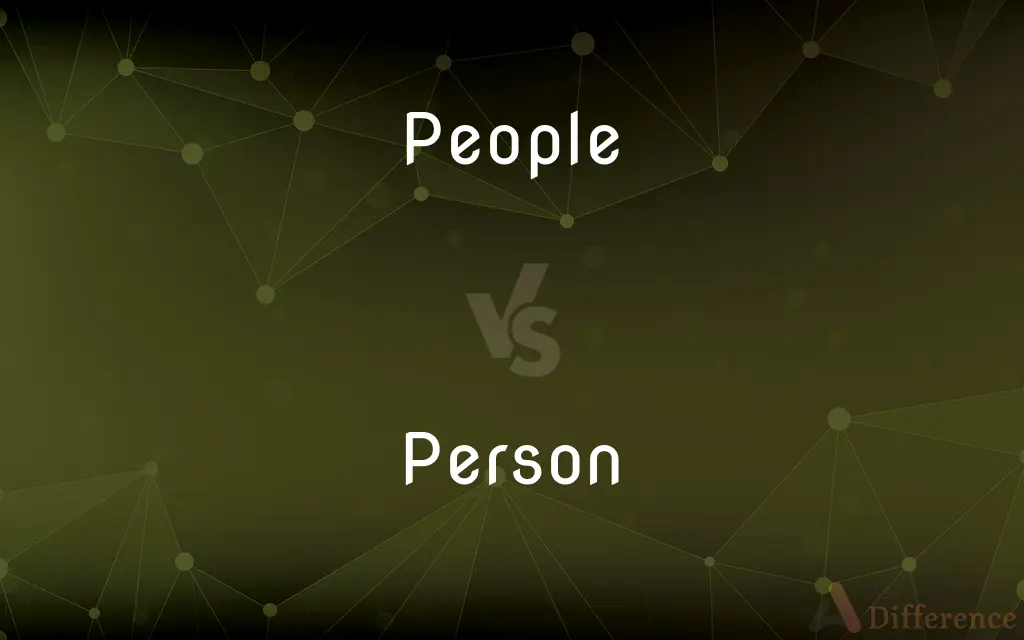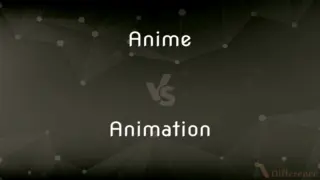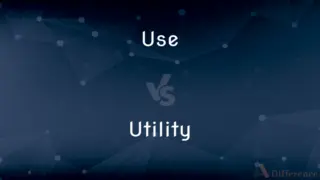People vs. Person — What's the Difference?

Difference Between People and Person
ADVERTISEMENT
Compare with Definitions
People
A people is a plurality of persons considered as a whole, as is the case with an ethnic group, nation or the public of a polity.
Person
A person (plural people or persons) is a being that has certain capacities or attributes such as reason, morality, consciousness or self-consciousness, and being a part of a culturally established form of social relations such as kinship, ownership of property, or legal responsibility. The defining features of personhood and, consequently, what makes a person count as a person, differ widely among cultures and contexts.In addition to the question of personhood, of what makes a being count as a person to begin with, there are further questions about personal identity and self: both about what makes any particular person that particular person instead of another, and about what makes a person at one time the same person as they were or will be at another time despite any intervening changes.
People
Human beings in general or considered collectively
The earthquake killed 30,000 people
People think I'm mad
Person
A living human. Often used in combination
Chairperson.
Salesperson. See Usage Note at chairman.
People
The members of a particular nation, community, or ethnic group
The native peoples of Canada
ADVERTISEMENT
Person
An individual of specified character
A person of importance.
People
The supporters or employees of a person in a position of power or authority
I've had my people watching the house for some time now
Person
The composite of characteristics that make up an individual personality; the self.
People
(of a group of people) inhabit (a place)
An arid mountain region peopled by warring clans
Person
The living body of a human
Searched the prisoner's person.
People
Humans considered as a group or in indefinite numbers. Often treated as a plural of person, alone and in compounds
People were dancing in the street. I met all sorts of people. This book is not intended for laypeople.
Person
Physique and general appearance.
People
The mass of ordinary persons; the populace. Used with the
"those who fear and distrust the people, and wish to draw all powers from them into the hands of the higher classes" (Thomas Jefferson).
Person
(Law) A human, corporation, organization, partnership, association, or other entity deemed or construed to be governed by a particular law.
People
A body of persons living in the same country under one national government; a nationality.
Person
(Christianity) Any of the three separate individualities of the Father, Son, and Holy Spirit, as distinguished from the essence of the Godhead that unites them.
People
The citizens of a political unit, such as a nation or state; the electorate. Used with the.
Person
Any of three groups of pronoun forms with corresponding verb inflections that distinguish the speaker (first person), the individual addressed (second person), and the individual or thing spoken of (third person).
People
Pl. peo·ples A body of persons sharing a common religion, culture, or language
The peoples of central Asia.
Person
Any of the different forms or inflections expressing these distinctions.
People
Persons with regard to their residence, class, profession, or group
City people.
Farming people.
Person
A character or role, as in a play; a guise
"Well, in her person, I say I will not have you" (Shakespeare).
People
Persons subordinate to or loyal to a ruler, superior, or employer
The manager would like to introduce you to our people in the regional office.
Person
An individual substance of a rational nature; usually a human being.
Each person is unique, both mentally and physically.
People
A person's family, relatives, or ancestors
Where are your people from?.
Person
A character or part, as in a play; a specific kind or manifestation of individual character, whether in real life, or in literary or dramatic representation; an assumed character.
People
(Informal) Animals or other beings distinct from humans
Rabbits and squirrels are the furry little people of the woods.
Person
(Christianity) Any one of the three hypostases of the Holy Trinity: the Father, Son, or Holy Spirit.
People
To settle or inhabit with people; populate.
Person
Any sentient or socially intelligent being.
People
To be present in or on (a place)
"The stores ... are peopled by serious shoppers" (Perri Klass).
Person
(in a compound noun or noun phrase) Someone who likes or has an affinity for (a specified thing).
Jack's always been a dog person, but I prefer cats.
People
Used as plural of person; a body of human beings considered generally or collectively; a group of two or more persons.
There were so many people at the restaurant last night.
Person
(in a compound noun or noun phrase) A human of unspecified gender (in terms usually constructed with man or woman).
People
(countable) Persons forming or belonging to a particular group, such as a nation, class, ethnic group, country, family, etc.
Person
(in a compound noun or noun phrase) A worker in a specified function or specialty.
I was able to speak to a technical support person and get the problem solved.
People
A group of persons regarded as being employees, followers, companions or subjects of a ruler.
Person
The physical body of a being seen as distinct from the mind, character, etc.
People
One's colleagues or employees.
Person
(law) Any individual or formal organization with standing before the courts.
At common law a corporation or a trust is legally a person.
People
A person's ancestors, relatives or family.
My people lived through the Black Plague and the Thirty Years War.
Person
The human genitalia; specifically, the penis.
People
The mass of a community as distinguished from a special class (elite); the commonalty; the populace; the vulgar; the common crowd; the citizens.
Person
(grammar) A linguistic category used to distinguish between the speaker of an utterance and those to whom or about whom they are speaking. See grammatical person.
People
Plural of person.
Person
(biology) A shoot or bud of a plant; a polyp or zooid of the compound Hydrozoa, Anthozoa, etc.; also, an individual, in the narrowest sense, among the higher animals.
People
(transitive) To stock with people or inhabitants; to fill as with people; to populate.
Person
To represent as a person; to personify; to impersonate.
People
(intransitive) To become populous or populated.
Person
To man, to supply with staff or crew.
People
(transitive) To inhabit; to occupy; to populate.
Person
A character or part, as in a play; a specific kind or manifestation of individual character, whether in real life, or in literary or dramatic representation; an assumed character.
His first appearance upon the stage in his new person of a sycophant or juggler.
No man can long put on a person and act a part.
To bear rule, which was thy partAnd person, hadst thou known thyself aright.
How different is the same man from himself, as he sustains the person of a magistrate and that of a friend!
People
To interact with people; to socialize.
Person
The bodily form of a human being; body; outward appearance; as, of comely person.
A fair persone, and strong, and young of age.
If it assume my noble father's person.
Love, sweetness, goodness, in her person shined.
People
The body of persons who compose a community, tribe, nation, or race; an aggregate of individuals forming a whole; a community; a nation.
Unto him shall the gathering of the people be.
The ants are a people not strong.
Before many peoples, and nations, and tongues.
Earth's monarchs are her peoples.
A government of all the people, by all the people, for all the people.
Person
A living, self-conscious being, as distinct from an animal or a thing; a moral agent; a human being; a man, woman, or child.
Consider what person stands for; which, I think, is a thinking, intelligent being, that has reason and reflection.
People
Persons, generally; an indefinite number of men and women; folks; population, or part of population; as, country people; - sometimes used as an indefinite subject or verb, like on in French, and man in German; as, people in adversity.
People were tempted to lend by great premiums.
People have lived twenty-four days upon nothing but water.
Person
A human being spoken of indefinitely; one; a man; as, any person present.
People
The mass of community as distinguished from a special class; the commonalty; the populace; the vulgar; the common crowd; as, nobles and people.
And strive to gain his pardon from the people.
Person
A parson; the parish priest.
People
One's ancestors or family; kindred; relations; as, my people were English.
Person
Among Trinitarians, one of the three subdivisions of the Godhead (the Father, the Son, and the Holy Ghost); an hypostasis.
People
To stock with people or inhabitants; to fill as with people; to populate.
As the gay motes that people the sunbeams.
Person
One of three relations or conditions (that of speaking, that of being spoken to, and that of being spoken of) pertaining to a noun or a pronoun, and thence also to the verb of which it may be the subject.
People
(plural) any group of human beings (men or women or children) collectively;
Old people
There were at least 200 people in the audience
Person
A shoot or bud of a plant; a polyp or zooid of the compound Hydrozoa Anthozoa, etc.; also, an individual, in the narrowest sense, among the higher animals.
True corms, composed of united personæ . . . usually arise by gemmation, . . . yet in sponges and corals occasionally by fusion of several originally distinct persons.
People
The body of citizens of a state or country;
The Spanish people
Person
To represent as a person; to personify; to impersonate.
People
The common people generally;
Separate the warriors from the mass
Power to the people
Person
A human being;
There was too much for one person to do
People
Members of a family line;
His people have been farmers for generations
Are your people still alive?
Person
A person's body (usually including their clothing);
A weapon was hidden on his person
People
Fill with people or supply with inhabitants;
People a room
The government wanted to populate the remote area of the country
Person
A grammatical category of pronouns and verb forms;
Stop talking about yourself in the third person
People
Make one's home or live in;
She resides officially in Iceland
I live in a 200-year old house
These people inhabited all the islands that are now deserted
The plains are sparsely populated
Share Your Discovery

Previous Comparison
Anime vs. Animation
Next Comparison
Use vs. Utility













































